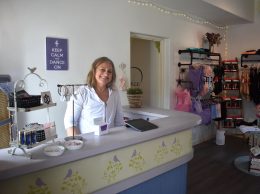Be honest and realize that it’s OK to say no to your business — really
IN THIS ARTICLE
- Op/Eds Topic
- Guest commentary Author
By Guest commentary Friday, December 18th, 2015
By Ray Bowman
I am often asked, “What does it take to grow a thriving business?” However, some of the more critical questions people should be asking — and often don’t — are, “How do I decide whether or not to grow or start a business?” and “Should I even start one in the first place?”
The need for these critical questions came to light during an annual review of client performance over the past year. While most of our clients engage and grow their businesses through our program, I noted that there were a number of clients who signed up for our services, which are free, and didn’t follow through with the recommended strategies and initiatives to start or grow their businesses.
The reasons for not going forward were varied, but some patterns arose: They were the result of both too much risk and not enough. For example, an existing business may decide that the work it takes to initiate new growth strategies may pose too much risk because it would have too much of a negative impact on the current operations or staff.
Risk and fear are important factors, and have been studied for years by researchers who focus on small business growth. Per Davidsson, author of “Entrepreneurship and the Growth of Firms” (Edward Elgar Publishing, 2006), identified concerns business leaders have toward growth.
These include the fear of having to work more or fewer hours, spending more or less time doing favorite tasks, impacting attitudes of their employees, decreasing their personal income by investing more in the business, giving up control, losing independence, having fewer resources in an emergency as a result of expansion and maintaining quality as a result of expansion.
These can be either valid concerns or misplaced fears about growing a business.
For startups, the decision “not to” or “should I?” often involves a founder not taking into account personal situations that can undermine their success and not looking at their business idea more pragmatically.
This dilemma was highlighted in “The Founder’s Dilemmas: Anticipating and Avoiding the Pitfalls That Can Sink a Startup” by Noam Wasserman (The Kauffman Foundation Series on Innovation and Entrepreneurship, 2013). The book studied the successes and failures of over 10,000 startups. He found that startups may lack the resources, experience and network required to make a startup business effective.
Conversely, startup founders may suffer from “golden handcuffs,” where family obligations, a well-paying job and high-priced lifestyle keep a business idea, with all of its risks, from coming to fruition.
A good number of our clients who decided not to grow their businesses had the resources, experience and opportunity to grow but still didn’t. When asked why, many clients said they wanted to keep things the same or didn’t have the time to make changes.
The idea of keeping things the same may fly in the face of the profit motive, but there are some valid points to the thought that every business has a “sweet spot” or that the timing might not be right, so saying no can be the right answer.
There is a statistical “sweet spot” for most businesses. However, it’s a moving target. A U.S. Census Department economist I spoke with noted that if a business wanted to stay the same, it would still have to grow at least enough to keep up with rising costs and keep pace with competitors’ growth. At the Small Business Development Center of Ventura and Santa Barbara Counties, we’ve noted that when businesses shut down, it’s often because they succumbed to a slow 2 to 3 percent decline over a few years as a result of “keeping things the same.”
Whether you are an existing business or startup, you should ask yourself if you have the resources, experience, social network and personal situation that will allow you to say yes to starting or growing your business.
Ask yourself if you have looked at your business pragmatically by doing market research, breakeven analysis and assessing your personal finances in order to validate your business idea. And think about what risk you’re willing to tolerate and what could be the consequences of not growing.
In the end, it’s important to be honest as you address these critical questions, realizing it’s OK to say no to growth or starting a business.
• Ray Bowman is the director of the Small Business Development Center of Ventura and Santa Barbara Counties.
Related Articles
 Friday, July 8th, 2022
Friday, July 8th, 2022
Businesses adapt as cities end pandemic policies that allowed free use of public spaces
 Wednesday, May 11th, 2022
Wednesday, May 11th, 2022










